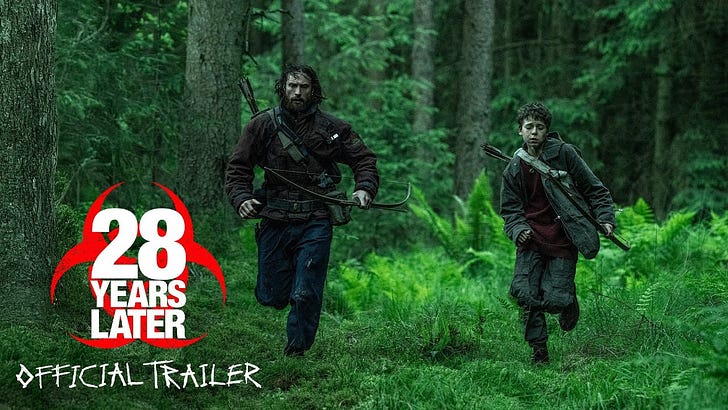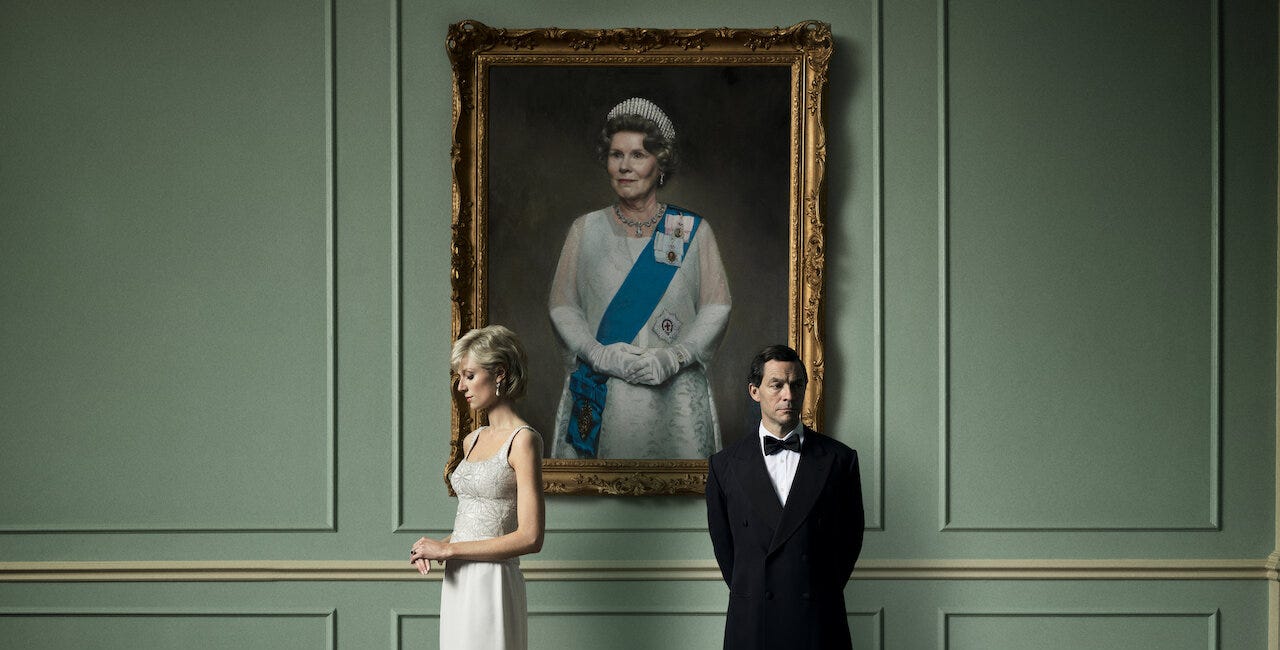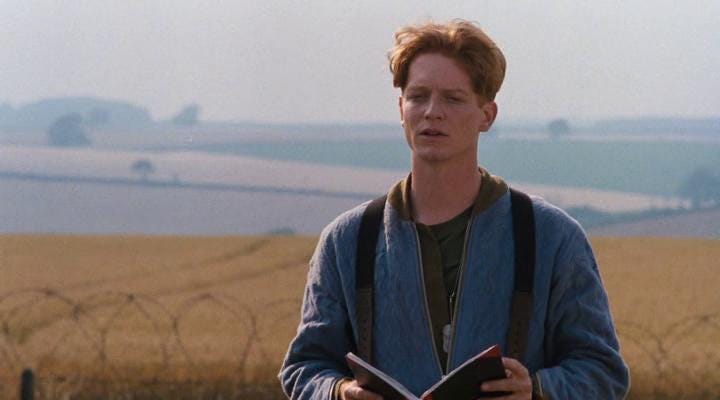The New Trailer for 28 Years Later Is Incredibly Disturbing, and We Have a Poet to Thank for That
The dark history of the 1903 poem that serves as a soundtrack to the first look at Danny Boyle's horror threequel.
I’ve never had an experience quite like watching the trailer for 28 Years Later.
Of the trailer for the film—the third in the 28 franchise first brought to life by Danny Boyle and Alex Garland in 2002—Stuart Heritage at The Guardian writes, “The effect of the poem is so immediately disturbing that it took me a few watches to actually pay attention to the visuals.”
What poem? And why is it so disturbing? To understand, you’ll just have to watch it for yourself (volume up, I beg of you):
The haunting text being read, screamed, and wailed in the above trailer is Rudyard Kipling’s poem, “Boots.” On the page, the poem’s deep rhythmic thudding and march-like cadence can be sensed through its em dashes and anaphora. But nothing—and I mean nothing—can prepare you for hearing the poem read aloud, or for hearing the particular rendition offered in the recording used in the trailer. Turns out, the poem’s real-life history is even scarier.
England’s Almost Laureate
It’s hard to overstate how well-known and well-regarded Kipling was in his time. One of England’s favorite literary sons, he wrote prose and poetry for both children and adults. Kipling also famously turned down the knighthood and British poet laureateship. He was kind of killing it back then.
As I noted in another article featuring Kipling, history has majorly cooled on this guy, due to improved understanding of racism and colonialism and how Kipling’s work upheld oppressive paradigms and structures. Read his work, as you must read most work produced by white men prior to the 21st century, with a sailing ship-sized grain of salt.
After reading and experiencing such a haunting poem of war, you might assume that Kipling had military experience himself, but you’d be wrong. Though he spent time fighting the war “in other ways,” he did not serve himself. He was politically active, however, and spent time with soldiers as a fledgling journalist.
He wrote what he knew, as the saying goes, but not necessarily from his personal experience. This aspect of Kipling’s war poems has caused some controversy among scholars, divided into those who believe that poets actually writing from the trenches of WWI like Wilfred Owen and Siegfried Sassoon are to be lauded over Kipling and those who believe that Kipling’s perspective, while not personal, is still valuable.
While I admire the technical skill of some of this work, I’m squarely on the side of giving Kipling—an outspoken colonialist and propagandist—the side eye.
The History of “Boots”
The recording you hear alongside the action in the trailer for 28 Years Later is the voice of actor Taylor Holmes (1878-1959) reciting the Kipling poem in 1915. 1915! The performance is still so fresh and urgent and terrifying that it feels deeply contemporary, but it’s actually more than 100 years old.
Holmes was best known in his day for his performances in Broadway plays and silent films. But his recitation of the poem has made him better known again in our time, particularly because his wild and emotional recording has been used in media and in (get this) military training camps.
Yeah, you read that right.
Want another layer of creepy? “Boots” has also been used in Survival, Evasion, Resistance, and Escape (SERE) training for U.S. military personnel and other civilians who want to go to the brink of their abilities to see if they can come out on the other side. The so-called “psychological effect” of the recording—the creep factor, the bizarrerie of it all—was used to try to break down subjects mentally as a kind of preparation for mental torture that might be inflicted upon them if they were captured.
I keep saying it: poetry is powerful. Being read out a passage of prose won’t have the same effect on the mind as poetry will: poetry’s deep rhythm, repetition, and insistence on intricate sound activate our minds in ways that are almost primal. Human interest in rhyme and sonic repetition are seeded in us in childhood, and this poem exploits that pulse.
How to Read It
Articles about “Boots” typically mention the relationship of the poem’s content to how it was intended to be read. In his A Handbook to the Poetry of Rudyard Kipling, critic Ralph Durand indicates that it should be read at the rate of “two words to a second.” Why? To emulate boots marching in time.
Durand himself served in both WWI and the Boer War, so he knows a thing or two about boots. But it seems that what he doesn’t know is music.
Either Durand misspoke in his oft-repeated quotation or he was envisioning a much peppier reading of the poem than the one Taylor offered and immortalized.
There are 60 seconds in one minute, so two words to one second would be 120 words per minute. Let’s take one of the poem’s typical repeated lines as an example:
Boots—boots—boots—boots—movin' up an' down again!
This line, like several others in the poem, makes use of monosyllabic words, so we can think of the word “boots” like a “beat.”
For reference, 120 beats per minute (bpm) is the standard tempo of “Stars and Stripes Forever,” if you’d like to hum it. Now imagine reading “Boots” at that tempo: no way. It loses so much of the power available to it by slowing down. In Taylor’s famous recitation, the actor utters just about one word for every two “beats” or boot steps, if you will. One can hardly imagine marching at 60bpm (60 steps per minute); by that same token, it’s absurd to think that one should fly through “Boots” at 120bpm.
I absolutely understand Durand’s point—that the poem should mirror the relentlessness of boot steps marching in time, and that the “time” in question should have a relationship to the feeling of a march. But I think the more measured (heh) approach that Holmes offers, particularly as his voice mounts to a scream, is much more successful.
Last Thoughts
Why this poem for this trailer? The 28 franchise is a zombie property, so we can certainly understand the “war” motif as a comment on the struggle between humans and zombies in the film. But the repetition of “there’s no discharge in the war” points to something even more sinister at the heart of the film: the relentlessness that survival requires of us, as well as the relentlessness of death.
An inescapable post-apocalyptic wasteland feels both close at hand, given current events, but also far removed as I write this inside an electrified room while watching the snow fall outside. When the film debuts in June 2025, we may find that its tenor feels different—in ways either better or worse.
Which reading speed do you prefer? Did this trailer freak you out as much as it freaked me out? Is that really a bony Cillian Murphy lookalike rising from the field in that one terrifying shot?!
Let me know what you think in the comments.
PopPoetry will return with more new content, including interviews, reviews, and the explainers you love, in 2025. Wishing you a happy holiday and a bright new year! Subscribe to get the first new post next year delivered directly to your inbox.
Related
For another taste of Kipling:
For more on poetry and war:








I don't know how long it's been since I watched a trailer that made me feel that disturbed ! Or if I've ever even experienced a trailer like this ever ! I was immediately creeper the hell out, and then the goosebumps came and grew and grew. So eerie and spooky. Thank you so much for this amazingly written article! Grateful for the knowledge of the history of that poem , which definitely made this trailer all the more scary.
I stumbled upon this piece while looking for the trailer, and I love your take. As both a poet and a musician, I fully experience the utter chill of this poem through this reading, and the pace is, I believe, absolutely appropriate. I truly have to believe it was misspoken, because I just did it out loud at that speed and it was almost off-putting! I love your writing style, and I’m glad I found this gem randomly on Google.